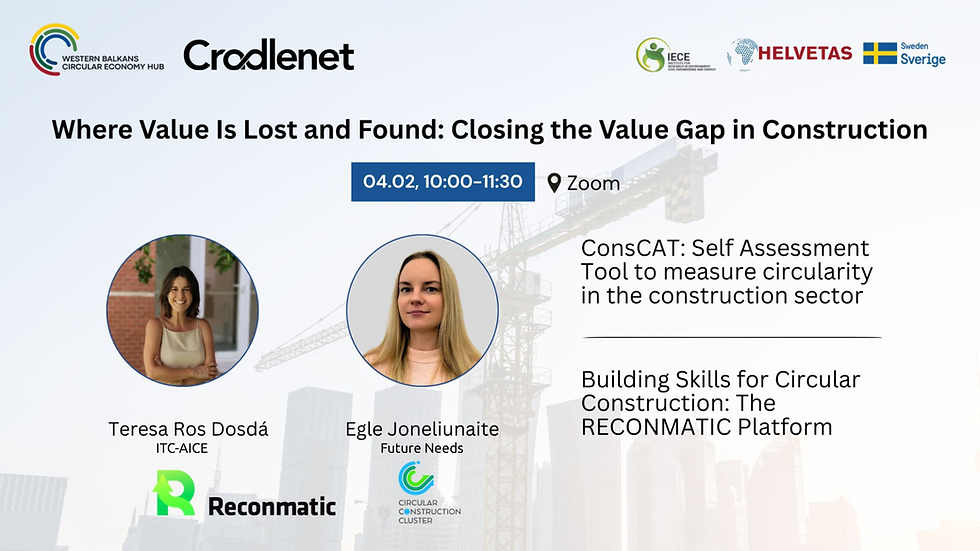RECONMATIC at RECYCLING 2025
- Apr 6, 2025
- 2 min read
Updated: Jun 25, 2025
RECONMATIC once again participated in the traditional national conference Recycling 2025: Circular Economy in Civil Engineering, Recycling, and Use of Secondary Materials, the 27th edition of this annual event. The conference was organised by the Association for the Development of Recycling of Construction and Demolition Waste (ARSM, www.arsm.cz) and took place in Brno on April 3rd and 4th.
Take a look at our insights and key takeaways from last year's RECYCLING conference
This year, the RECONMATIC project was represented by the team from the Faculty of Civil Engineering at the Czech Technical University in Prague (FCE CTU in Prague), who presented several examples of progress made over the past year.

Student Theses on Sustainable Construction
As part of the RECONMATIC project, two student theses were completed at FCE CTU in Prague, each addressing pressing topics in sustainable construction:
Thesis 1: Investigated the use of finely ground construction and demolition waste (CDW) as a partial replacement for cement in cementitious composites. This approach offers a dual benefit—reducing CDW disposal issues and lowering the carbon footprint of cement production.
Thesis 2: Focused on the recycling of gypsum plasterboard waste and its reuse in the production of new gypsum binders. This research supports the circular use of gypsum-based materials and enhances resource efficiency within the construction sector.
Both topics sparked meaningful discussions with many conference participants.
Conference Presentations and Research Highlights
Two major papers from the RECONMATIC team were presented at the conference and drew significant attention from experts in the field:
Paper 1: Examined the use of waste glass as a partial replacement for cement in cement composites. The experimental results showed that waste glass improves long-term compressive strength due to its pozzolanic reactivity, while also delivering environmental benefits by diverting glass waste from landfills.
Paper 2: Explored the recycling of plasterboard waste through re-calcination. The study demonstrated that this process can reduce dependence on natural gypsum and contribute to more sustainable construction practices.

Impact and Engagement
Overall, the RECONMATIC project has made a meaningful contribution to the scientific and public discussion around sustainable construction and circular economy in the built environment. The results clearly demonstrate the potential of recycling and reuse strategies for construction waste, promoting more environmentally responsible practices across the sector.
In addition to research dissemination, the project has actively engaged with industry partners and professionals, supporting the transfer of academic findings to practical applications.
Panel Discussion on CDW Recycling Challenges
Finally, the RECONMATIC project coordinator was invited to participate in a panel discussion dedicated to the challenges and barriers hindering more effective recycling of construction and demolition waste. This opportunity further emphasized the project’s commitment to shaping the future of sustainable construction through research, collaboration, and real-world impact.
Don’t miss the latest updates — subscribe to our newsletter and follow the RECONMATIC project on LinkedIn and X. for more insights from our demos and innovations in circular construction.


